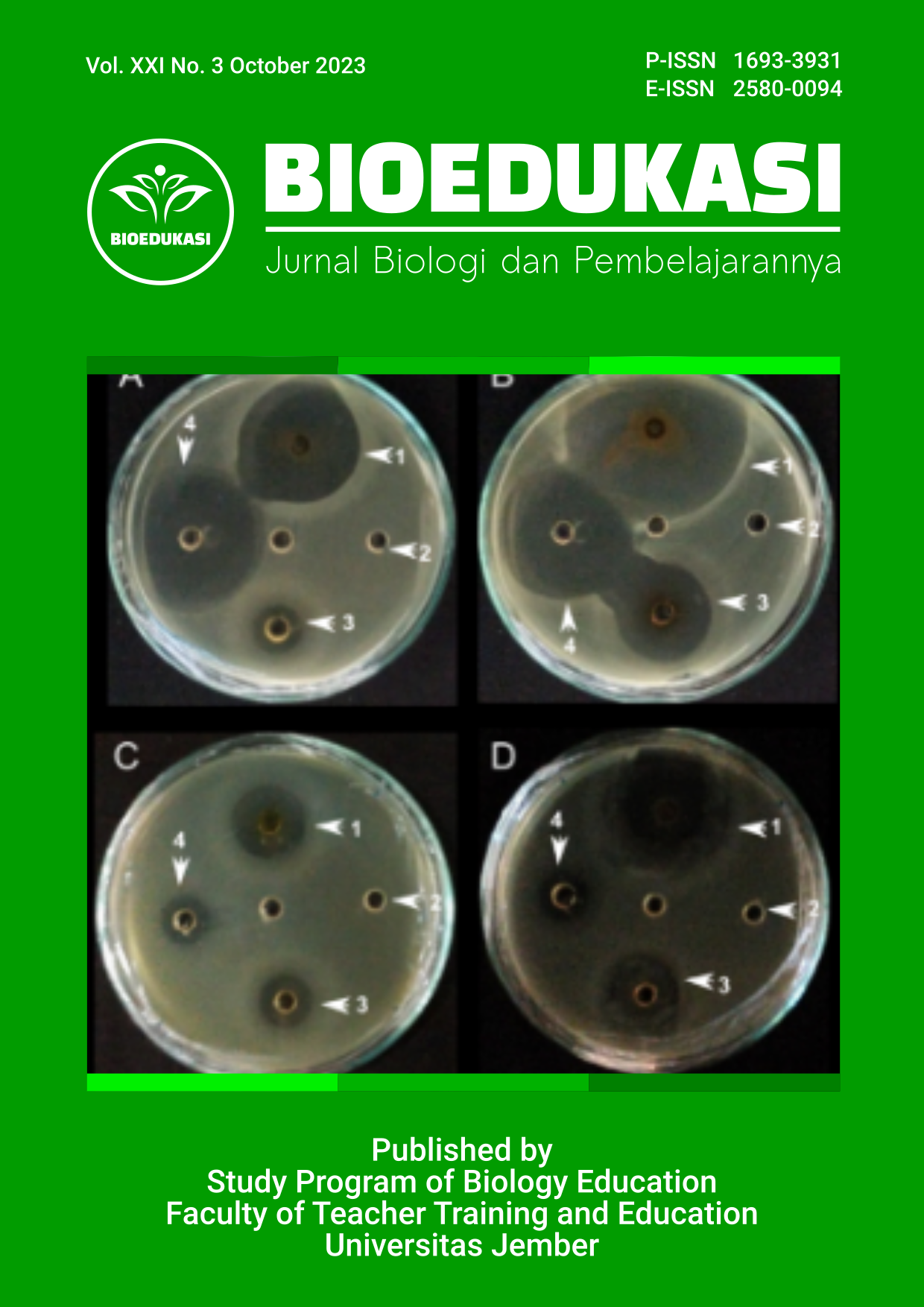Implication of Problem-Based Scenarios on Students' ESD Anticipatory Competency on the Concept of Environmental Change
DOI:
https://doi.org/10.19184/bioedu.v21i3.40115Keywords:
Anticipatory Competency, Environmental Change, Problem-Based ScenariosAbstract
This study aims to determine the effect of problem-based scenarios on students' ESD Anticipatory Competency on environmental change material. It is motivated by the difficulty of students when asked to respond to future events, and further research needs to be done on the right learning model to equip Anticipatory Competency. So the learning model used in this study is Problem-Based Scenarios. The type of research used is quasi-experiment with Non Equivalent Control Group Design. The research sample was selected using purposive sampling, class X IPA as an experimental class of 19 students and X IPS-2 as a control class with 18 students. The instruments used in this study were Anticipatory Competency questions consisting of 5 essay questions, and a questionnaire for students' responses to Problem-Based Scenarios consisting of 10 statements. The results of the study based on hypothesis testing obtained a significance value of Sig (2-tailed) of 0.000, then H0 is rejected and H1 is accepted. The results of the students' response questionnaire regarding the use of Problem-Based Scenarios showed an average score in the excellent category (81-100). The results of the instrument in this study indicate that problem-based scenarios affect the Anticipatory Competency of students on Environmental Change material.
Downloads
References
Al-attar, R. H. (2019). The Effectiveness of Using Scenario-Based Learning Strategy in Developing EFL Eleventh Graders ’ Speaking and Prospective Thinking Skills. May 2019.
Carroll, J. M. (1999). Five reasons for scenario-based design. Proceedings of the Hawaii International Conference on System Sciences, 00(c), 123. https://doi.org/10.1109/hicss.1999.772890
Clark, R. (2009). Accelerating Expertise with Scenario Based Learning. United States: American Society for Teaching and Development.
De Haan, G. (2006). The BLK ‘21’ programme in Germany: A ‘Gestaltungskompetenz’-based model for Education for Sustainable Development. Environmental Education Research, 12(1), 19–32. https://doi.org/10.1080/13504620500526362
De Haan, G. (2010). The development of ESD-related competencies in supportive institutional frameworks. International Review of Education, 56(2), 315–328. https://doi.org/10.1007/s11159-010-9157-9
Dewi, R. P., & Khoirunisa, N. (2018). Middle school student’s perception of climate change at Boyolali District, Indonesia. IOP Conference Series: Earth and Environmental Science, 200(1). https://doi.org/10.1088/1755-1315/200/1/012061
Giangrande, N., White, R. M., East, M., Jackson, R., Clarke, T., Coste, M. S., & Penha-Lopes, G. (2019). A competency framework to assess and activate education for sustainable development: Addressing the UN sustainable development goals 4.7 challenge. Sustainability (Switzerland), 11(10), 1–16. https://doi.org/10.3390/su11102832
Gonda, R. L., DeHart, K., Ashman, T. L., & Legg, A. S. (2015). “The Strawberry Caperâ€: Using scenario-based problem solving to integrate middle school science topics. American Biology Teacher, 77(1), 50–54. https://doi.org/10.1525/abt.2015.77.1.7
Halder, J., & Islam, N. (2015). Water Pollution and its Impact on the Human Health. Journal of Environment and Human, 2(1), 36–46. https://doi.org/10.15764/eh.2015.01005
Huriye, D (2021). Problem-based Scenario Method with Experiments: Determining the Prospective Science Teachers’ Biology Self- efficacy and Critical Thinking Tendency. 32(1), 23–33.
Ireland, L., Nickson, A., Sorin, R., Caltabiano, M., & Errington, E. P. (2013). a Funny Thing Happened on the Way To Learning : Sbl Fosters Student Engagement in Higher Education. 2(2), 249–256.
Kosow, H. ;, & Gaßner, R. (2008). www.ssoar.info Methods of Future and Scenario Analysis: Overview, Assessment, and Selection Criteria Zur Verfügung gestellt in Kooperation mit / provided in cooperation with. www.ssoar.info
Lin, L., Yang, H., & Xu, X. (2022). Effects of Water Pollution on Human Health and Disease Heterogeneity: A Review. Frontiers in Environmental Science, 10(June). https://doi.org/10.3389/fenvs.2022.880246
Matos, J. F. (2014). PrincÃpios Orientadores para o Design de Cenários de Aprendizagem. 1–17. https://drive.google.com/open?id=0Bw9_y3mpURWiUFpsV2cxS2FyVkk
Nurroniah, S. (2017). Pengaruh WrittendDan Oral Feedback pada Asesmen Kinerja untuk Meningkatkan Kemampuan Prediksi Siswa tentang Ekosistem [Universitas Pendidikan Indonesia]. http://repository.upi.edu/30933/
Ojala, M. (2017). Hope and anticipation in education for a sustainable future. Futures, 94, 76–84. https://doi.org/10.1016/j.futures.2016.10.004
Paige, K., & Lloyd, D. (2016). Use of Future Scenarios as a Pedagogical Approach for Science Teacher Education. Research in Science Education, 46(2), 263–285. https://doi.org/10.1007/s11165-015-9505-7
Pedro, A., Piedade, J., Matos, J. F., & Pedro, N. (2019). Redesigning initial teacher’s education practices with learning scenarios. International Journal of Information and Learning Technology, 36(3), 266–283. https://doi.org/10.1108/IJILT-11-2018-0131
Rieckmann, M. (2012). Future-oriented higher education: Which key competencies should be fostered through university teaching and learning? Futures, 44(2), 127–135. https://doi.org/10.1016/j.futures.2011.09.005
Roberts, T. (2011). Preparing graduates for the professions using scenarioâ€based learning. Innovations in Education and Teaching International, 48(2), 223–224. https://doi.org/10.1080/14703297.2011.564022
Rosa, F. O. (2017). Eksplorasi kemampuan kognitif siswa terhadap kemampuan memprediksi, mengobservasi dan menjelaska ditinjau dari gender. Jurnal Pendidikan Fisika Universitas Muhammadiyah Metro, 5(2), 111–118.
Sarabhai, K. V. (2015). ESD for Sustainable Development Goals (SDGs). Journal of Education for Sustainable Development, 9(2), 121–123. https://doi.org/10.1177/0973408215600601
Schank, R.C. (2002). Designing World Class E-learning. New York, United States: McGraw-Hill.
Sezgin Selcuk, G. (2015). A Problem-Based Learning scenario that can be used in. Asia Pacific Forum on Science Learning and Teaching, 16(2), 1–26.
Sugiyono. (2017). Metode Penelitian Kuantitatif, Kualitatif, dan R&D. Bandung : Alfabeta, CV.
Tetchueng, J. L., Garlatti, S., & Laubé, S. (2008). A Context-Aware Learning System based on generic scenarios and the theory in didactic anthropology of knowledge. 5(Special Issue on New Trends on AI Techniques for Educational Technologies), 71–87.
UNESCO. (2012). Education for Sustainable Development in Action. In United Nations Educational, Scientific and Cultural Organization.
UNESCO. (2017). Education for Sustainable Development Goals (SDGs). In European Conference on Educational Research 2017.
UNESCO. (2020). The United Nations World Water Development Report 2020 - water and climate change. the United Nations Educational, Scientific and Cultural Organization.
University, A. S. (2016). Key Competencies in Sustainability Defining Key Competencies. Arizona State University.
Wiek, A., Withycombe, L., & Redman, C. L. (2011). Key competencies in sustainability: A reference framework for academic program development. Sustainability Science, 6(2), 203–218. https://doi.org/10.1007/s11625-011-0132-6
Wilujeng, I., Dwandaru, W. S. B., & Rauf, R. A. B. A. (2019). The effectiveness of education for environmental sustainable development to enhance environmental literacy in science education: A case study of hydropower. Jurnal Pendidikan IPA Indonesia, 8(4), 521–528. https://doi.org/10.15294/jpii.v8i4.19948






